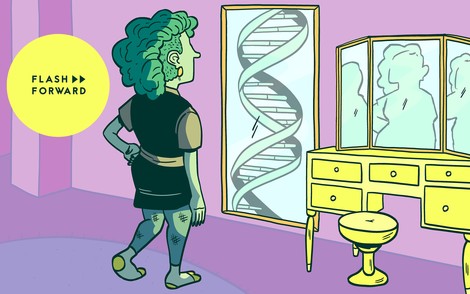Your podcast discovery platform
Curious minds select the most fascinating podcasts from around the world. Discover hand-piqd audio recommendations on your favorite topics.

piqer for: Global finds Technology and society Health and Sanity
Nechama Brodie is a South African journalist and researcher. She is the author of six books, including two critically acclaimed urban histories of Johannesburg and Cape Town. She works as the head of training and research at TRI Facts, part of independent fact-checking organisation Africa Check, and is completing a PhD in data methodology and media studies at the University of the Witwatersrand.
No, Finding 'Native American' DNA In A Test Doesn't Suddenly Make You Part Indian
As a writer and as a historian, I am interested in two unrelated but converging aspects of identity. In fiction (and reporting), the acknowledgement of the damage done by cultural appropriation and the importance of representation is growing – by this I mean, we are becoming increasingly aware that, say, a white correspondent from the United States or Europe who parachutes in (not literally) to a 'brown' country to 'tell its story' often doesn't get the actual inside story, or represents it mostly through a Western lens in which brown people are primitive, poor, and other stereotypes. Ditto male novelists who write female characters, often in unintentionally laughable, gendered terms. Not to say these feats cannot be pulled off, just that they require more caution and transparency than previously assumed.
A related challenge is appearing in connection with the new spate of private DNA testing companies offering to 'reveal' your supposed ancestry, by snipping off and analyzing slices of your genetic data. The internet is full of cute little adverts showing individuals who have discovered long-lost Irish or German or Scandinavian or even African ancestry, confirming or challenging their own personally held notions of cultural identity.
The last phrase is the important one: cultural identity is often not built on DNA at all. And vice versa: having supposed genetic content that a small commercial service claims is (or is not) similar to other genetic databases, doesn't suddenly mean you're someone new or that you are entitled to membership of the actual cultures and groups referred to. Case in point: Americans who contact tribal authorities and ask to be enrolled on the basis of a single DNA test.
Why this is a problem (and why DNA ancestry tests can be wrong, and do not entitle anyone to automatic enrollment) is complex, and this excellent podcast (with a full transcript of the show beneath, if you prefer to read) goes really far in explaining the issues and the science.
Stay up to date – with a newsletter from your channel on Global finds.
